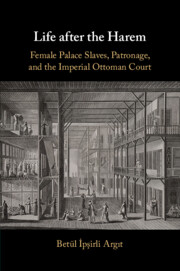Book contents
- Life after the Harem
- Life after the Harem
- Copyright page
- Dedication
- Contents
- Illustrations
- Maps
- Graphs
- Tables
- Acknowledgments
- Note on Usage
- Abbreviations
- Introduction
- 1 The Imperial Harem and Its Residents
- 2 Departure from the Imperial Palace and Changing Relationships with the Imperial Court
- 3 Marriage Patterns
- 4 Residential Districts and Relations with Society
- 5 Material World: Fortunes and Possessions
- 6 Charitable Activities: Architectural Patronage and Endowments
- Conclusion
- Appendix Residential Neighborhoods of Palace Women in intra muros Istanbul
- Bibliography
- Index
6 - Charitable Activities: Architectural Patronage and Endowments
Published online by Cambridge University Press: 08 October 2020
- Life after the Harem
- Life after the Harem
- Copyright page
- Dedication
- Contents
- Illustrations
- Maps
- Graphs
- Tables
- Acknowledgments
- Note on Usage
- Abbreviations
- Introduction
- 1 The Imperial Harem and Its Residents
- 2 Departure from the Imperial Palace and Changing Relationships with the Imperial Court
- 3 Marriage Patterns
- 4 Residential Districts and Relations with Society
- 5 Material World: Fortunes and Possessions
- 6 Charitable Activities: Architectural Patronage and Endowments
- Conclusion
- Appendix Residential Neighborhoods of Palace Women in intra muros Istanbul
- Bibliography
- Index
Summary
In addition to facilitating the accumulation of wealth, palace affiliation also created a group of women who had the resources and inclination to engage in charitable activities. A career in the harem underscored by material and moral patronage enabled many of these former slaves to amass the necessary resources—wealth, status, and networks—to be charitable. Thus, chapter 5 deals with another component of the material world, that of the charitable activities of female members of the imperial court. More specifically, the chapter examines their architectural patronage and endowments. In the previous chapters, palace women appeared as the receivers of patronage. In this chapter, they appear as dispensers of patronage as a result of the patronage that they themselves had received. The chapter endeavors to locate the impact of being affiliated with a particular household on the charitable activities of its members. It also aims to evaluate the possible implications that the charitable activities of this group of women had for the imperial court, the members of the imperial household, and Ottoman society. It demonstrates how female members of the imperial court engaged in charitable activities that served the interests of both Ottoman subjects and members of the imperial court, while also leaving their individual mark on the architectural, social, urban, religious, and intellectual landscape of various regions of the empire
- Type
- Chapter
- Information
- Life after the HaremFemale Palace Slaves, Patronage and the Imperial Ottoman Court, pp. 199 - 225Publisher: Cambridge University PressPrint publication year: 2020



